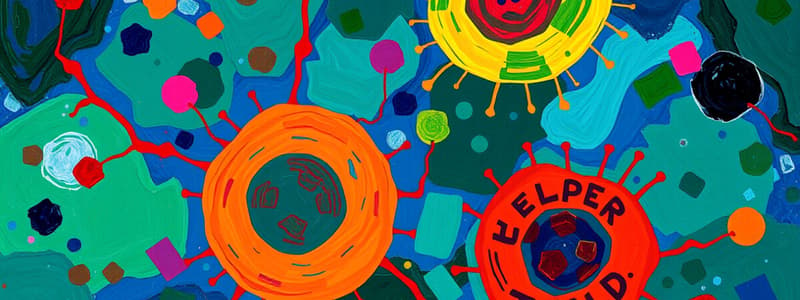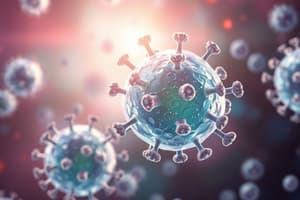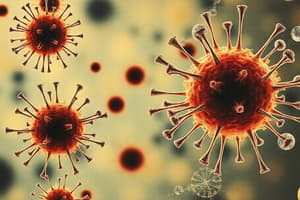Podcast
Questions and Answers
What is the main role of CD40L in the immune response?
What is the main role of CD40L in the immune response?
- Engaging with CD40 on macrophages and B cells to activate them (correct)
- Inhibiting the proliferation of virus-infected cells
- Directly killing infected cells
- Stimulating the production of Ig-E by plasma cells
Which cytokine is specifically associated with the activation of macrophages by TH1 cells?
Which cytokine is specifically associated with the activation of macrophages by TH1 cells?
- IFN-y (correct)
- TNF
- IL-4
- IL-10
What is the role of IL-5 in the immune response?
What is the role of IL-5 in the immune response?
- Increasing macrophage cytokine production
- Stimulating T cell differentiation
- Activating eosinophils (correct)
- Promoting B cell proliferation
Which of the following cytokines limits and terminates immune responses?
Which of the following cytokines limits and terminates immune responses?
What type of immune cell do TH2 cells induce the activation of through the 'alternative pathway'?
What type of immune cell do TH2 cells induce the activation of through the 'alternative pathway'?
Which major source produces cytokines in an innate immune response?
Which major source produces cytokines in an innate immune response?
Which population of T cells is primarily responsible for secreting cytokines during adaptive immune responses?
Which population of T cells is primarily responsible for secreting cytokines during adaptive immune responses?
What do colony-stimulating factors (CSFs) stimulate?
What do colony-stimulating factors (CSFs) stimulate?
What effect do TH17 cells have on neutrophils and monocytes?
What effect do TH17 cells have on neutrophils and monocytes?
How do activated CD8+ T lymphocytes contribute to combating infection?
How do activated CD8+ T lymphocytes contribute to combating infection?
What is the primary role of B cells in the immune response?
What is the primary role of B cells in the immune response?
Which statement best describes the role of natural killer (NK) cells?
Which statement best describes the role of natural killer (NK) cells?
What characterizes Type II hypersensitivity reactions?
What characterizes Type II hypersensitivity reactions?
What are antigen presenting cells (APCs) primarily responsible for?
What are antigen presenting cells (APCs) primarily responsible for?
Which organ is NOT classified as a generative lymphoid organ?
Which organ is NOT classified as a generative lymphoid organ?
Type I hypersensitivity disorders are primarily characterized by which mechanism?
Type I hypersensitivity disorders are primarily characterized by which mechanism?
What manifests as inflammation in the early reaction to microbes?
What manifests as inflammation in the early reaction to microbes?
Which of the following best defines Type III hypersensitivity?
Which of the following best defines Type III hypersensitivity?
What is the primary cause of acute serum sickness?
What is the primary cause of acute serum sickness?
Which component of the immune response is primarily involved in the formation of immune complexes?
Which component of the immune response is primarily involved in the formation of immune complexes?
Which disease is associated with immune complexes formed from nuclear antigens?
Which disease is associated with immune complexes formed from nuclear antigens?
What role do activated TH17 cells play in immune responses?
What role do activated TH17 cells play in immune responses?
In which condition might streptococcal cell wall antigens contribute to nephritis?
In which condition might streptococcal cell wall antigens contribute to nephritis?
What is the primary feature of the Arthus reaction?
What is the primary feature of the Arthus reaction?
What cell types are primarily involved in delayed-type hypersensitivity (DTH) reactions?
What cell types are primarily involved in delayed-type hypersensitivity (DTH) reactions?
What cytokine does TH17 primarily produce to amplify its response?
What cytokine does TH17 primarily produce to amplify its response?
What is a key characteristic of the pathogenesis of systemic immune complex disease?
What is a key characteristic of the pathogenesis of systemic immune complex disease?
Which statement accurately describes the fate of activated B lymphocytes?
Which statement accurately describes the fate of activated B lymphocytes?
How do helper T cells assist B lymphocytes during the immune response?
How do helper T cells assist B lymphocytes during the immune response?
Which types of antigens primarily stimulate the secretion of IgM antibodies?
Which types of antigens primarily stimulate the secretion of IgM antibodies?
What role do adjuvants play in the immune response?
What role do adjuvants play in the immune response?
Which cell type is primarily responsible for inducing isotype switching in B lymphocytes?
Which cell type is primarily responsible for inducing isotype switching in B lymphocytes?
What is the primary function of IgG antibodies?
What is the primary function of IgG antibodies?
Which characteristic is true about T-dependent antibody responses?
Which characteristic is true about T-dependent antibody responses?
What is indicated by the term 'affinity maturation' in the context of B cell activation?
What is indicated by the term 'affinity maturation' in the context of B cell activation?
What role do costimulatory molecules play in T cell activation?
What role do costimulatory molecules play in T cell activation?
Which of the following best describes the primary mechanism of antigen recognition by B cells?
Which of the following best describes the primary mechanism of antigen recognition by B cells?
What is the primary role of CD8+ cytotoxic T lymphocytes?
What is the primary role of CD8+ cytotoxic T lymphocytes?
Which immunoglobulin is primarily responsible for neutralizing microbes in mucus membranes?
Which immunoglobulin is primarily responsible for neutralizing microbes in mucus membranes?
What characterizes memory cells in the immune response?
What characterizes memory cells in the immune response?
What is the main cause of hypersensitivity reactions?
What is the main cause of hypersensitivity reactions?
Which cytokine profile is associated with the production of IgE and activation of eosinophils?
Which cytokine profile is associated with the production of IgE and activation of eosinophils?
Which type of immunity is conferred to neonates via maternal antibodies?
Which type of immunity is conferred to neonates via maternal antibodies?
What is the role of Toll-like receptors in the innate immune system?
What is the role of Toll-like receptors in the innate immune system?
What distinguishes autoimmune diseases from allergies?
What distinguishes autoimmune diseases from allergies?
What happens to the majority of effector lymphocytes after the elimination of microbes?
What happens to the majority of effector lymphocytes after the elimination of microbes?
Which type of antibodies can activate the classical pathway of the complement system?
Which type of antibodies can activate the classical pathway of the complement system?
Flashcards are hidden until you start studying
Study Notes
Functions of Helper T Cells
- Helper T cells mediate immune responses through CD40L and cytokines.
- Cytokines produced rapidly in innate immunity respond to microbes via macrophages, dendritic cells, and NK cells.
- CD4+ helper T cells express CD40L upon recognizing antigens, activating macrophages and B cells.
- Key cytokines include TNF, IL-1, IL-12, and type I IFNs, involved in inducing inflammation and inhibiting virus replication.
- Activated CD4+ cells differentiate into effector cells, secreting various cytokines (IL-2, IL-4, IL-5, IL-17, IFN-γ).
- TH1 cells produce IFN-γ, which activates macrophages and supports the destruction of ingested microbes through classical activation.
- TH2 cells secrete IL-4 and IL-5, which stimulate B cells and activate eosinophils to target helminthic parasites.
- TH17 cells release IL-17, recruiting neutrophils and monocytes to combat extracellular bacteria and fungi.
Adaptive Immune Response
- Steps: antigen recognition, lymphocyte activation and proliferation into effector/memory cells, antigen elimination, and memory cell persistence.
- B lymphocytes become plasma cells after activation, secreting various classes of antibodies.
- T-dependent responses require helper T cell assistance to activate B cells via CD40L and cytokine signaling.
- Plasma cells can produce different antibody classes: IgM, IgG, IgA, and IgE after isotype switching, influenced by cytokines.
Antigen Presentation and Recognition
- Dendritic cells capture and present protein antigens to T cells via class II MHC in lymph nodes.
- B cells recognize diverse antigens through membrane-bound antibody receptors, engaging multiple epitopes for activation.
- Adjuvants enhance immune response by stimulating innate immunity and promoting the activation of T cells and APCs.
Role of Antibodies
- IgG: opsonizes microbes for phagocytosis and provides passive immunity to neonates, with a half-life of about 3 weeks.
- IgM: primarily involved in the early immune response, activates the classical complement pathway.
- IgA: found in mucosal secretions, neutralizes pathogens in the respiratory and gastrointestinal tracts.
- IgE: binds to allergens and activates eosinophils to target parasites.
Hypersensitivity
- Hypersensitivity refers to injurious immune reactions that lead to tissue damage or disease.
- Reactions can be caused by environmental antigens (allergies) or self-antigens (autoimmune diseases).
- Four types of hypersensitivity classifications:
- Type I (immediate): mediated by TH2 cells, IgE, and mast cells.
- Type II (antibody-mediated): involves IgG and IgM antibodies causing cell injury.
- Type III (immune-complex mediated): involves circulating immune complexes inducing inflammation.
- Type IV (T cell-mediated): includes delayed-type hypersensitivity reactions mediated by CD4+ T cells.
Stages of Immune Complex Disease
- Immune complexes form when antibodies react with antigens in circulation, leading to various pathogenic responses.
- Examples of immune complex-mediated diseases include Systemic Lupus Erythematosus (SLE), Poststreptococcal glomerulonephritis, and Serum sickness.
- Acute serum sickness can occur after the administration of foreign proteins, resulting in a systemic immune response that targets these proteins.
Mechanisms of Tissue Injury
- Mechanisms causing tissue injury in hypersensitivity involve inflammation, immune complex deposition, and antibody-mediated cytotoxicity.
- T cells facilitate inflammatory reactions through cytokine release, recruiting leukocytes that amplify tissue damage.
- Chronic inflammation can lead to granuloma formation in response to persistent antigens.
Immunologic Memory
- Following an immune response, effector lymphocytes undergo apoptosis while memory cells remain long-lived, providing rapid responses upon re-exposure to antigens.
- Memory cells enable quicker and more effective immune responses compared to naïve cells, essential for vaccination strategies.
Studying That Suits You
Use AI to generate personalized quizzes and flashcards to suit your learning preferences.



